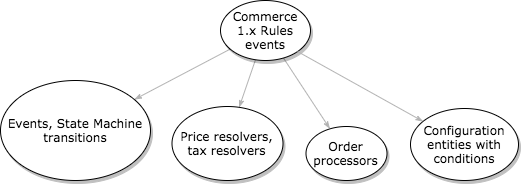Adapting from 1.x
This section is for helping bridge the 1.x to 2.x gap for developers who have previously used Drupal Commerce.
Understanding Drupal 8
We need help filling out this section! Feel free to follow the edit this page link and contribute.
Link to resources for getting used to D8.
Topics like: dependency injecting, event subscribers. We shouldn't recreate existing efforts here, but link to them.
Product information structure
We need help filling out this section! Feel free to follow the edit this page link and contribute.
No more nodes.
Products -> Product variations.
1.x Products == 2.x variations. No directly edit for variations anymore.
Attributes are their own entity, not taxonomy terms.
Taxes and VAT
We need help filling out this section! Feel free to follow the edit this page link and contribute.
Core tax deprecates all VAT contrib.
Shipping
We need help filling out this section! Feel free to follow the edit this page link and contribute.
Explain
- Shipping has flat rate in it, now.
- 2.x shipping combines many contrib efforts
- Packaging logic, boxing, fullfillment.
Discounts and coupons
We need help filling out this section! Feel free to follow the edit this page link and contribute.
Now in core for discount + coupon as promotions.
Price calculation
The base price of a product variation is the price without adjustments (i.e. without promotions, taxes etc). Price resolving is the process of finding the base price of the variation. Price resolvers are services. The default price resolver simply returns the price in the variations's price field.
To actually resolve a price, commerce uses the commerce_price.chain_price_resolver service which finds all price resolver services and calls their resolve() method until one of them returns a price. For example, to support multiple currencies one could implement a custom price resolver service fetching the price with the appropriate currency from a multivalue price field.
Price resolvers do not know about the order the product has been added to. Enter order processors.
Order refresh runs order processors to (among others) add adjustments (e.g. promotions, taxes) to the order. An adjustment can rely on order data when changing the price.
The commerce_order.price_calculator service can be used to find out the variation price including adjustments. It is used by the commerce_price_calculated field formatter implemented in the commerce_order module. It works by creating an unsaved order and applying adjustments on it.
Commerce without Rules

Commerce 2.x no longer relies on the Rules module. We now have event subscribers (example: order state changes), resolvers (example: calculating sell price and calculating VAT), and entities configured with conditions (example: payment gateways).
Be aware that some events correspond to state transitions, and the State Machine module fires them upon a transition. You can find the metadata for these in MODULENAME.workflows.yml. Events are also documented in the \Drupal\MODULENAME\Event namespace as a final class containing constants. For an example of using these, see \Drupal\commerce_log\EventSubscriber\OrderEventSubscriber::getSubscribedEvents().
Partial list of where the Rules went
| Commerce 1.x | Commerce 2.x |
|---|---|
| Completing the checkout process Rules event | commerce_order.place transition; modules react to this and alter the order as needed |
| When an order is first paid in full Rules event | commerce_order.fulfill transition (note: does not correspond 1:1 to Drupal 7, but can be used for many of the same purposes) |
| After adding a product to the cart Rules event | commerce_cart.entity.add event |
| After updating an existing commerce order | commerce_order.commerce_order.update event |
| Calculating the sell price of a product event | Now handled through price resolvers, tax resolvers, and order processors. Search for tag: commerce_price.price_resolver in the codebase for examples. |
| Select available payment methods for an order event | Now handled through payment gateway configurations at Administration » Commerce » Configuration » Payment gateways. These support various conditions to define when payment gateways should be usable by customers. |
More on resolvers
@todo: Link to relevant resolver docs, as well.
We need help filling out this section! Feel free to follow the edit this page link and contribute.
Link to books and tutorials: